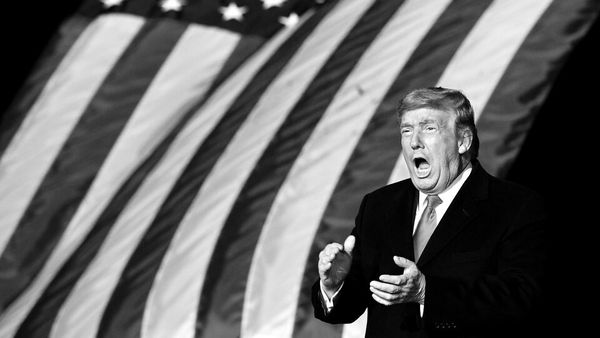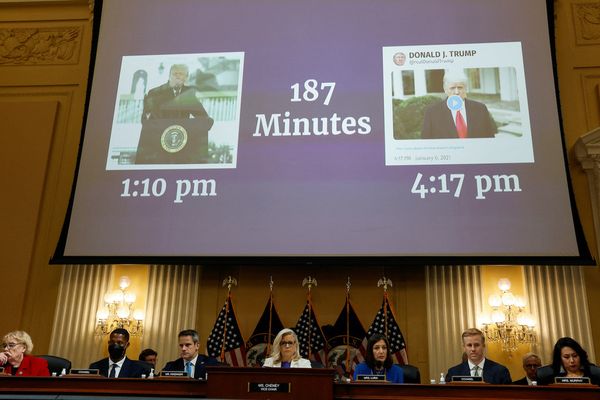
You have to say this for America in 2022. They know how to put on a show. The January 6 hearings in Washington have made for riveting viewing. Someday the last days of Trump will be turned into a movie, and it will make a worthy successor to films about political collapse like Downfall or The Damned. The testimony of Cassidy Hutchinson, a surprise witness – just like in the movies! – offered one hit scene after another: the president of the United States saying he didn’t much care whether his own vice-president was hanged; Trump lunging for the steering wheel; the ketchup dripping down the wall after he threw his lunch. The last planned public hearing is scheduled for Thursday. CNN describes the event as having “all the makings of a potential blockbuster”. But the hearings already have been a massively successful work of political spectacle; and that’s where their danger lies.
The organizers of the January 6 hearings had no choice but to resort to showmanship. They clearly learned the lesson of the Mueller report. When Mueller gathered the findings of his investigation into the Trump campaign’s expectation to “benefit electorally” from Russian disinformation campaigns, he released them as a book. He may as well have put his findings in a bottle and thrown them into the sea. Americans don’t go to books to understand the world any more. They go to their screens. That’s one of the most prominent truths revealed by the Trump years: spectacle wins. The sheer capacity to gather attention is, by far, the most important force in US politics.
On that level, the January 6 hearings have been a resounding success. The ratings have been superb. Nearly 20 million people watched the first prime time hearing, which puts it roughly on the level of Sunday Night Football. Not only have the hearings managed a large audience, but the narrative they are telling has registered. Republican megadonors no longer find Trump as appealing as they once did, at least this week, and several conservative legal scholars have declared that the hearings have changed their minds on his culpability, whether that matters or not.
But as the hearings come to a close, the very success of their presentation presents a very real danger to the republic they purport to be saving. With every display of some new idiocy or corruption, whether it’s the random presence of the former Overstock CEO Patrick Byrne in the events leading up to the near-fall of the United States, or Jason Van Tatenhove’s description of “armed revolution”, the same question rears its threatening head: So what?
If the January 6 hearings turn out to be mere spectacle, they will have been a complete disaster. The Trump years revealed something other than that spectacle wins. They also revealed that the American system of government is basically a collection of habits and expectations. The actual structure of American government is crumbling plaster and cobwebs. Anyone who wants to can shred it with a gesture. American democracy is hanging on by the skin of its norms. And the hearings are, quite by accident, shifting those norms.
American tolerance for political illegitimacy grows by way of exposure. Weekly, sometimes daily, the American public is shown some new completely unacceptable abuse of power. The revelations don’t make any difference or have any consequences. And as the American tolerance for political illegitimacy grows, the size of the monstrosity the country will accept swells. The January 6 committee has gathered the attention of the American people admirably. But now the country and the world are learning from what they’re watching. It’s not just liberals eagerly anticipating the exposure of the grifters and buffoons surrounding the president in his final days in office. Republican officials and white power movements are watching, too. And both sides are asking themselves one principal question: What can you get away with in America in the 2020s?
Every time the January 6 committee reveals a new crime and the committee members spread their arms to the American public as if to say “Are you willing to have this done in your name?” they are not asking a rhetorical question. Every crime the committee shows that goes unpunished moves the line of acceptable political behavior in the United States a little lower.
They have now put themselves in a situation where action is required: Arrest Donald Trump or accept a political future without standards or guardrails. But you can’t arrest Donald Trump with a camera.
In our screen-addled culture, political spectacle is a requirement; no one can attain or wield power without it. In the end, if the spectacle doesn’t result in change, it only adds to the despair and futility dragging the American political system down. Trump was the reality television president. His term in office turned the United States into a four-year-long episode of The Real Housewives of Washington. The January 6 committee has used the master’s tools against him; they have shown that spectacle can be used against misinformation. But a show is not a system of government. And when the show comes to an end, what will be left behind?
This article was amended on 21 July 2022. An earlier version incorrectly described Patrick Byrne as the CEO of Overstock; he resigned and sold his ownership in 2019.
Stephen Marche is the author, most recently, of The Next Civil War: Dispatches from the American Future










